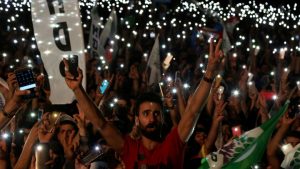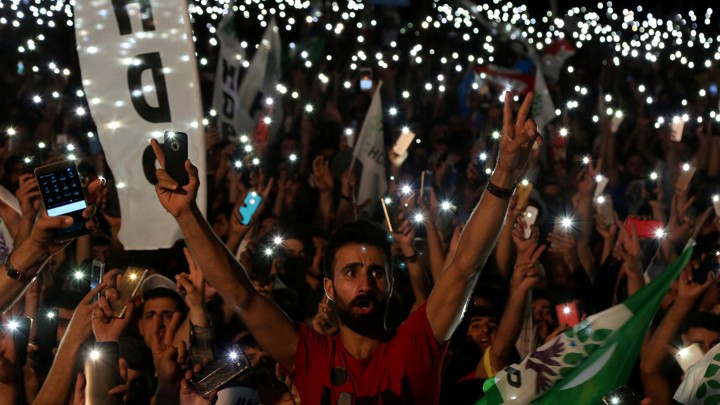The Atlantic

Ahead of tomorrow’s elections, Ankara is expected to tamper with the vote and make life difficult for members of the embattled minority group.

Across Turkey, HDP members on the campaign trail have reported similar incidents of intimidation. As of Friday, at least 375 HDP campaigners had been detained and 18 arrested, according to the party. Though the HDP drew about six million votes in the June 2015 elections, about 13 percent of the electorate that year, state officials accuse the party of being a political extension of the Kurdistan Workers’ Party (PKK), an outlawed militia founded in the late 1970s.
All this has hurt Erdoğan’s standing among Kurds in both the pro and anti-HDP camps. This comes as he seeks to consolidate governing powers under his presidency, which he hoped to extend when he called for this Sunday’s snap presidential and parliamentary elections back in April. Instead, due to a falling currency and the rise of challenger Muharrem Ince of the Republican People’s Party, he now faces the most serious test of his 16-year rule. What should have been an easy win for Erdoğan has become a tight race—one that could hinge on the Kurdish vote.
This election will be Turkey’s first under the wide-ranging election reformspushed through in March by Erdoğan, his Justice and Development Party (AKP), and their nationalist allies in parliament. Those reforms merged voting districts and changed the location of polling stations in Kurdish-majority districts, greatly inconveniencing voters in those areas. The reforms also weakened ballot-verification protocols, a change that may invite greater voter fraud, and allow police and soldiers to monitor polling stations on election day. Erdoğan has said the changes are necessary for “security reasons,” but opponents have insisted that the reforms could suppress the Kurdish vote. “When we are talking about security problems, the state of conflict was more intense in the November 2015 elections and April 2017 referendum,” Zulkuf Karatekin, head of election affairs at the HDP office in Diyarbakir, told me. “These decisions are only being taken now to prevent the HDP supporters from going to the ballot boxes and casting their votes.”
Turkish law requires political parties to draw at least 10 percent of the total vote in order to enter the parliament. If a party falls below that threshold, its votes would be redistributed among competitors based on their election performance—in most cases, that means they’d go to the AKP. In order to avoid a second-round vote and secure a majority in parliament, Erdoğan and his party will need at least 50 percent of the vote on Sunday. For this reason, pressuring HDP supporters plays largely to his favor, which he admitted in a leaked speech to AKP members in Istanbul. “If the HDP falls below the election threshold, it would mean that we would be in a much better place,” Erdoğan said. “You will take the voter lists for each ballot box and conduct special work,” he added.
Zingil said her party has organized transportation services to accommodate such residents, but cannot predict what obstacles they may face. “In the past, when we were transporting voters, the military would stop us and say there were mines on the road ahead and that the road was closed,” Zingil told me. “This could happen again.”
State officials did not respond to multiple interview requests, but Mehdi Eker, an AKP deputy in Diyarbakir, told the Financial Times the number of voters impacted by ballot-box relocations was too small to sway results, given that Turkey’s electorate includes some 59 million voters. “The PKK and their devotees, the HDP, put pressure on people,” Eker said, insisting the election reforms would ensure greater integrity at the ballot box. “This time people will be much more free.”
Most ballot-box relocations are occurring in places like Hani and Lice, near the mountains regularly bombed by Turkish jets searching for PKK hideouts. But some are happening in places like Resik, a largely pro-HDP village in southeast Turkey of 171 mostly elderly voters that has been conflict-free for decades. “I’m supposed to make sure that every person is able to vote,” village leader Abdulbari Fahrioglu told me. “But now that the ballot box is in [another] village, I don’t have any jurisdiction there.”
The validity of the physical ballots and the envelopes in which they are cast has also come into question. In past elections, both the ballot and the envelope were required to carry official stamps from Turkey’s Supreme Electoral Council (YSK). After the reforms in March, along with decisions made just four days before election day, the stamps are no longer required. In conjunction, these actions will weaken anti-fraud measures, effectively legalizing the voting irregularities documented during last year’s referendum in which opposition parties questioned the validity of 2.5 million votes. “In 2017, there were accusations of ballot stuffing and voter intimidation coming from the southeast combined with statistical irregularities where districts that had been heavily opposed to Erdoğan suddenly swung dramatically in his favor,” Nicholas Danforth, a senior analyst at the Bipartisan Policy Center in Washington, D.C., told me. “Since the first free election in 1950, there’s never been this much concern about the fairness of the vote count itself,” he said.
As we spoke, Zeytun told me two plain-clothed police officers were sitting just outside, and that his group has been under daily surveillance for years. Government officials, he said, have been using the ongoing state of emergency to suppress opponents through mass detentions, dismissals, and forced closures of numerous civil society organizations and media outlets.
What most concerned Zeytun was the possibility that Erdoğan may take actions to undermine his opponents’ efforts to protect the vote, under the vague justification of “security reasons.” “It’s definitely one of the most unfair elections in our history,” he said. “It has more injustices than we experienced in the nineties—only without the extrajudicial killings of politicians.”



